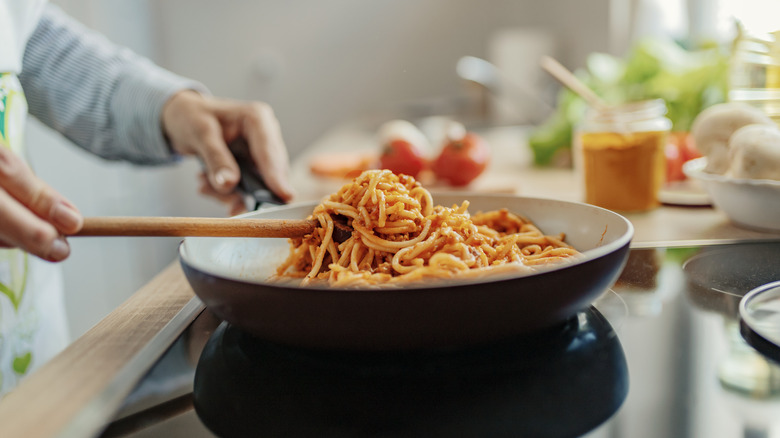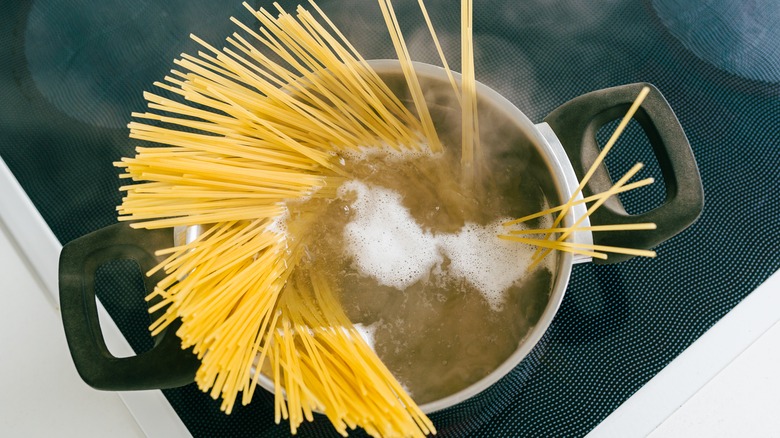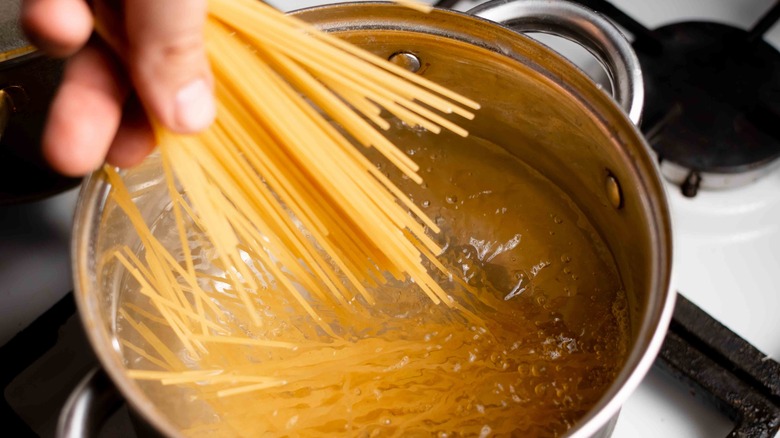Why It Pays To Finish Pasta In A Pan
The perfect plate of pasta is just about heaven, frankly. Sauce perfectly combines with pasta to create something beyond the individual traits of both aspects of the dish. Then again, a bad plate of pasta is, well, terrible. There is nothing more disappointing than a plate of noodles sitting in oil and topped with just a bit of sauce, causing dry noodles and inconsistent sauce coverage. But what's the secret to achieving that perfectly melded, sauced, and flavorful pasta?
Well, there might be one step in your pasta-making process that you still need to include, which might be just the thing holding you back from the ideal plate (or bowl). For many home cooks, pasta comes together with sauce on the plate, or in a bowl after cooking. However, for the best possible results, your pasta should finish cooking with the sauce in a saucepan. Doing so has several benefits which can take your dish to the next level.
But how does this trick help to zhuzh up your noodles? Well, the secret is in the sauce (and pasta water). For one, if you add in your pasta while it is still al dente — a little undercooked — your pasta will finish cooking in the sauce, allowing it to absorb the flavor of the sauce. Additionally, the pasta water carried over from the pasta and into the pan will help the sauce to better adhere to your noodles. Both of these aspects help to create a more cohesive and delicious plate.
The magic of pasta water
There is some undeniable magic in pasta water. Home cooks and professional chefs alike rely on the hazy, salty, starchy liquid. Aside from helping to meld pasta with sauce, pasta water has many different uses in the kitchen, including elevating soup and bread recipes. But what makes pasta water so useful?
For one, pasta water contains starches. And these starches are key to achieving the perfect sauce. The starches in pasta water help the pasta to adhere to the sauce when everything is added to your dish. To get the most out of this hack, it's best to simply scoop your pasta directly from the pot of water and into your saucepan rather than rinsing or draining your pasta. This way, the pasta water will carry over from the pot without having to scoop it in separately. Additionally, scooping your pasta directly into the pot will allow the starches in your pasta to remain intact, allowing your noodles to better stick to your sauce.
But that's not all, that delicious pasta water carried over from your pot will also help to thicken up your sauce. This will help keep your sauce from separating from your pasta, or from being too runny. So if you want the perfect, thick, and perfectly melded pasta, make sure to keep your pasta water on hand.
Why to keep it al dente
But the infusion of pasta water is just one reason why finishing your pasta in the pan helps to perfect your dish. Keeping your pasta al dente until you bring it over to the pan is the other vital part of this hack. It might seem counterproductive to undercook your pasta before adding it to your sauce. However, doing so will allow your pasta to finish cooking, rather than overcooking, in your sauce.
In addition to this, your pasta will be further infused with your sauce's flavor as it finishes cooking in the pan. This is because rather than cooking in water, your pasta will be cooked in sauce. And the starches released by your noodles cooking directly in your pasta pot will help your noodles and sauce stick together, melding perfectly together in the pan without overcooking the pasta. Of course, this won't work for all pasta. Fresh, homemade pasta, for example, cannot be cooked to al dente, so you might want to just pop it into your water for only a few minutes before moving it over to the sauce.


